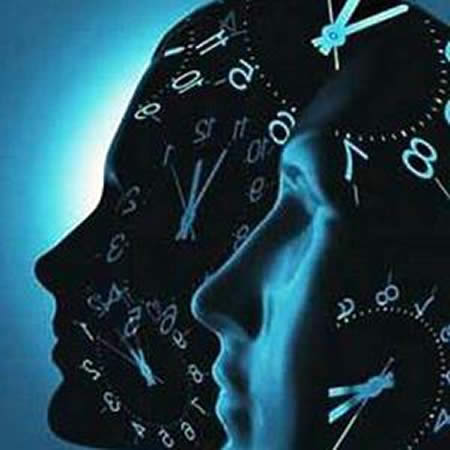New research into circadian rhythms by researchers at the University of Toronto Mississauga shows that the GRK2 protein plays a major role in regulating the body’s internal clock and points the way to remedies for jet lag and shift work exhaustion.
The study, published in the Aug. 25 issue of Cell Reports, was authored by graduate students Neel Mehta, Arthur H. Cheng, Lucia Mendoza Viveros and post-doctoral fellow Cheng-Kang Chiang, under the supervision of Hai-Ying M. Cheng, a professor in the Department of Biology.
“In our brain, we have an internal master clock called the suprachiasmatic nucleus (SCN) that generates and governs circadian rhythms,” says Mehta, who recently earned his MSc and is moving on to PhD studies. “Our internal clocks must regularly be re-set so they are always close to being in synchrony with the external environmental time.
“For example, when people are jet-lagged, there is asynchrony between the internal clock and the new environmental light-dark cycle. We keep experiencing jetlag until finally our internal clocks manually re-set themselves to the new environmental schedule.”

Mehta and his colleagues looked at how the SCN clock functions in the brain at the molecular level by exploring the regulatory roles played by the protein, GRK2, which is more traditionally known for the important role it plays in regulating heart function. In this study, the researchers determined that GRK2 was also abundantly expressed in the SCN throughout all phases of the circadian cycle.
The researchers first used mice as test subjects, since their SCN master clock is similar to that of humans. They compared mice that were missing GRK2 with ordinary mice and found those that lacked the protein had a lengthened behavioral circadian rhythm, an impaired response to light and took longer to recover from experientially simulated jet lag.
Next, the researchers considered what too much GRK2 protein might mean for PERIOD1 and PERIOD2—key proteins required for the clock to function properly. They found that GRK2 suppressed the genetic copying of PERIOD1 and prevented the transport of PERIOD1 and PERIOD2 proteins into the nucleus of the cell, where they are protected against degradation. “If this trafficking is inhibited, the clock won’t function properly,” Mehta says.
The full suite of tests run by the researchers shed light on additional mechanisms and signaling pathways involved in regulating the circadian clock at the molecular level. Their findings suggest that GRK2 has an important impact on circadian clock speed, amplitude and re-setting.
“Having a greater understating of the regulatory mechanisms controlling our circadian clocks points the way to more specialized research, such as teasing out mechanisms that might be critical for the clocks’ proper functioning, and for human health in general,” Mehta says, noting jet lag and the regular exhaustion experienced by shift workers as two obvious areas for further exploration.
Source: Elaine Smith – University of Toronto Mississauga
Image Credit: The image is credited to University of Toronto Mississauga
Original Research: Full open access research for “GRK2 Fine-Tunes Circadian Clock Speed and Entrainment via Transcriptional and Post-translational Control of PERIOD Proteins” by Neel Mehta, Arthur H. Cheng, Cheng-Kang Chiang, Lucia Mendoza-Viveros, Harrod H. Ling, Abhilasha Patel, Bo Xu, Daniel Figeys, and Hai-Ying M. Cheng in Cell Reports. Published online August 13 2015 doi:10.1016/j.celrep.2015.07.037
Abstract
GRK2 Fine-Tunes Circadian Clock Speed and Entrainment via Transcriptional and Post-translational Control of PERIOD Proteins
Highlights
•GRK2 ablation alters light-induced entrainment and delays recovery from jetlag
•GRK2 ablation increases circadian amplitude and decreases circadian period
•GRK2 suppresses mPeriod1 transcription and PERIOD1/2 nuclear trafficking
•GRK2 physically binds to PERIOD1/2 and promotes PERIOD2 phosphorylation
Summary
The pacemaker properties of the suprachiasmatic nucleus (SCN) circadian clock are shaped by mechanisms that influence the expression and behavior of clock proteins. Here, we reveal that G-protein-coupled receptor kinase 2 (GRK2) modulates the period, amplitude, and entrainment characteristics of the SCN. Grk2-deficient mice show phase-dependent alterations in light-induced entrainment, slower recovery from jetlag, and longer behavioral rhythms. Grk2 ablation perturbs intrinsic rhythmic properties of the SCN, increasing amplitude and decreasing period. At the cellular level, GRK2 suppresses the transcription of the mPeriod1 gene and the trafficking of PERIOD1 and PERIOD2 proteins to the nucleus. Moreover, GRK2 can physically interact with PERIOD1/2 and promote PERIOD2 phosphorylation at Ser545, effects that may underlie its ability to regulate PERIOD1/2 trafficking. Together, our findings identify GRK2 as an important modulator of circadian clock speed, amplitude, and entrainment by controlling PERIOD at the transcriptional and post-translational levels.
“GRK2 Fine-Tunes Circadian Clock Speed and Entrainment via Transcriptional and Post-translational Control of PERIOD Proteins” by Neel Mehta, Arthur H. Cheng, Cheng-Kang Chiang, Lucia Mendoza-Viveros, Harrod H. Ling, Abhilasha Patel, Bo Xu, Daniel Figeys, and Hai-Ying M. Cheng in Cell Reports. Published online August 13 2015 doi:10.1016/j.celrep.2015.07.037






